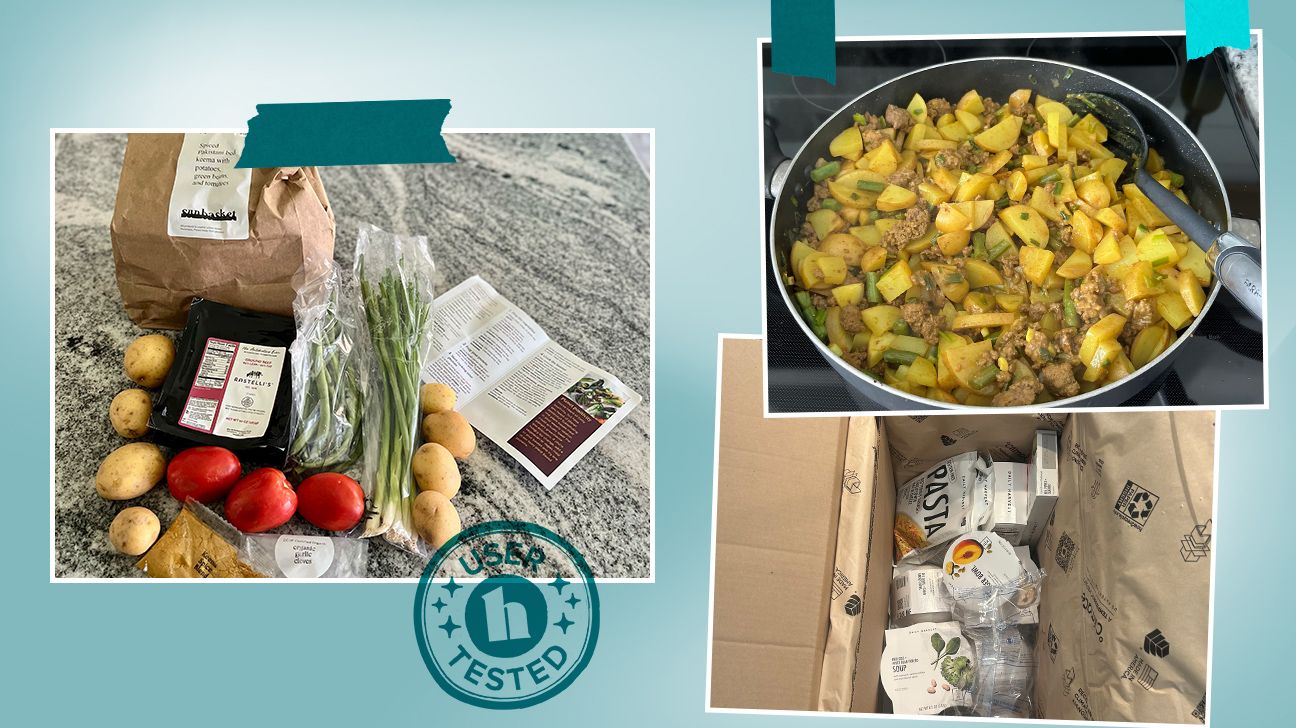No pesticides and no extensive meal planning? Sold!
Organic meal delivery services are where convenience and healthy eating intersect. We tasted, vetted, and approved six.
Sunbasket’s Black Angus Rib Eye and Romanesco meal kit. Photo by Kelli McGrane, MS, RD
If you prefer to eat organic but lack the time or motivation to shop for, plan, and prep all your meals at home, you might consider organic meal delivery services. From prepared meals that you simply reheat to meal kits that you cook yourself, these services make eating organic easier.
Read on to learn about the organic meal delivery services that consistently wow our reviewers.
Disclaimer: All of the services tested below were tried by Healthline writers or editors, who received the meals for free. All opinions are our own. Pricing information is current as of publication and is subject to change.
• mostly organic ingredients
• prepared meals
• mostly organic produce
• some organic meats and poultry
• prepared meals
• $49.99 to Alaska and Hawaii
Our Medical Standards and Insights team has carefully researched and vetted over 11,000 products and services. We fact-check health claims, evaluate menus and ingredients, and look into each brand’s reputation before sharing products and services on Healthline.
To choose the meal delivery services on this page, we considered all the services that passed our vetting process. Then, we personally tested some of them to narrow down our list even further. Read more about how we test meal delivery services.
Testers select a week’s worth of meals from multiple menus to get a well-rounded view of the types of flavors and ingredients offered.
As part of our testing, we consider several factors, including the ease of the signup and meal selection process, the variety and nutritional composition of the meals offered, ingredient quality and freshness, ease of cooking, and, of course, the taste. We score them accordingly.
There are several factors to consider when choosing an organic meal delivery service. As you search for an organic meal delivery service, keep these items front of mind:
- What “organic” means to different companies: Some companies source only organic produce, while others include additional organic items, such as eggs or tofu. Others use non-organic ingredients if they need to. You can choose the service that most closely aligns with your preferences.
- Diet friendliness: If you’re following a specific diet, choosing a service that offers a wide variety of recipes to fit your dietary needs can be helpful. For example, if you’re following a vegan or low calorie diet, you might look for a service offering plant-based meals or organic meal delivery for weight loss.
- Variety for your dietary preferences: If you’re following a diet such as keto or vegan, choosing a service that offers an array of recipes to fit your dietary needs can be helpful.
- Food allergies: If you have severe food allergies, it’s essential to ensure that the company you choose has strict protocols to avoid cross-contamination.
- Ease of preparation: Meal services are meant to make your life easier. Some services send the ingredients you need to prepare meals at home, while others ship fully prepared items that just need to be reheated. One of these two approaches could be better for you, depending on your time constraints.
Other factors to consider include cost and delivery availability. In addition, you may want to opt for services that use recyclable packaging materials and sustainably sourced ingredients and prioritize animal welfare.
Organic labels to look for
Here are some labels you can look out for to identify if a food is truly organic or not:
- USDA Organic Seal: The USDA has established an official organic certification program. To obtain this seal, produce must meet strict government standards.
- 100% organic: The product is made entirely from organic ingredients.
- Organic: At least 95% of the ingredients in the product are organic.
- Made with organic ingredients: At least 70% of the ingredients used are organic. These products cannot be labeled organic or use the USDA Organic Seal.
Choosing an organic meal delivery service ensures you receive meals prepared according to strict USDA standards. As part of these standards, these foods must be grown or raised without the use of hormones, antibiotics, artificial chemicals, and genetically modified organisms (GMOs).
Some people may prefer to purchase organic foods because organic farming practices tend to be more environmentally friendly and result in reduced levels of pesticide residues on crops like fruits, vegetables, and grains.
Organic foods may have a slightly different nutritional profile than their conventional counterparts, though more research is needed.
The healthiest meal delivery program depends on individual dietary needs and preferences.
We chose Green Chef for the best organic meal delivery because it offers a wide variety of meal options catering to different health goals, emphasizing the use of organic produce and proteins raised with high animal welfare standards. This makes it a strong contender for both eco- and health-conscious consumers.
Green Chef is similar to HelloFresh but offers certified organic ingredients. It provides a variety of meal kits that cater to specific dietary preferences.
The healthiest delivery food depends on your dietary needs. Green Chef offers a range of organic, nutrient-dense meal kits, while Daily Harvest focuses on plant-based, organic prepared meals that emphasize fruits and vegetables.
For weight loss goals, we chose Trifecta as the best option. Consider your personal goals and preferences before deciding which one is right for you.
There are many reasons a person may prioritize choosing organic ingredients, including reduced exposure to pesticides, more sustainable farming practices, and potential nutritional benefits.
If you prefer to eat organic, there are several meal delivery services to choose from, varying in the types of organic items they provide, how much prep work is required, and price.





